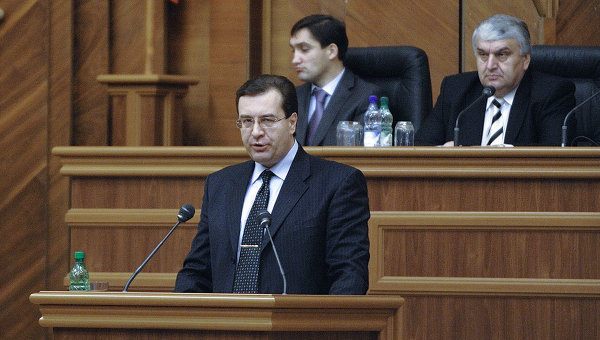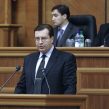
Moldova’s Latest Elections: a Chance to Mend the Political Turmoil
Publication: Eurasia Daily Monitor Volume: 8 Issue: 5
By:

Moldova illustrates the risks of introducing a parliamentary system of government prematurely, ahead of state consolidation, institution building, or even genuine party building. Inverting that sequence can disorganize and destabilize the state itself, then return authoritarians to power. Ukraine, Moldova, and Kyrgyzstan have each alternated between premature experiments with parliamentary government and authoritarian restoration during the past decade. Moldova first introduced parliamentary government in 1999-2000, its collapse facilitating the Communist Party’s return to power. The communists retained the parliamentary republic on paper, but governed Moldova as a presidential republic de facto in 2001-2009.
Moldova’s state presidency is technically vacant since April 2009, with hung parliaments serially failing to elect a head of state. Two parliaments elected during this period had lifetimes of just three months and 16 months, respectively. The parliament elected in July 2009 continued sitting throughout 2010, despite the constitution stipulating dissolution of parliament and new elections after two failed attempts to elect the head of state. In April 2009, protesters sacked and set fire to the parliament and presidential buildings.
The country has experienced two years of permanent electoral campaigning since January 2009. Moldova held parliamentary elections in April 2009, July 2009, and November 2010; presidential elections in June 2009 and October-November 2009 (two rounds in each case); and an equally futile constitutional referendum in September 2010. The dust barely settled on the November 2010 parliamentary elections, campaigning will start country-wide in April 2011 for municipal and district elections, due in June. AEI’s three parties will compete against each other, severely testing the coalition.
The country has wasted two years with electoral strife which might not yet be over. This has disabled Moldova from reforming its political system, the judiciary, police, and public administration (Igor Botan, ADEPT Journal, December 31, 2010). Moldova’s political and constitutional crisis has given Russia the pretext for refusing any negotiations on the Transnistria conflict.
The parliamentary elections of November 28, 2010 have finally led to reconstituting the Alliance for European Integration (AEI) of three parties on December 28-30, with a working majority in parliament, and a cabinet of ministers ready-formed for imminent confirmation (Moldpres, January 3-6).
However, AEI’s 59 parliamentary seats fall short of the 61 necessary for electing the head of state, and/or revising the constitution, in the 101-seat parliament. The opposition Communist Party with its 42 seats can block those AEI initiatives, or alternatively extract concessions. Under the existing constitution, parliament’s failure to elect the head of state would trigger its dissolution and new parliamentary elections.
Communist leverage is limited, however. Should this party block AEI’s initiatives on the president and the constitution, the communists would be blamed for forcing yet another election and would lose heavily in that eventuality. Meanwhile, AEI’s parties are interested in exercising power through the just-elected parliament and incoming AEI government. The coalition is also eager to move toward an association agreement with the European Union. These considerations are likely to impel the AEI and the Communist Party into a bargain for electing the head of state and revising the constitution.
Constitutionally or legally there is no clear deadline for electing the head of state in parliament (apart from the dissolution mechanism). AEI politicians are now weighing at least three options for overcoming the deadlock: a) a bargain with the Communist Party in the new parliament; b) a deal with a few Communist deputies in this parliament; and c) bypassing the parliament to amend the constitution by referendum, so as to be able to elect the head of state with a simple majority in this same parliament. Any of these solutions might enable the new parliament to survive for a four-year electoral cycle. AEI’s fourth and least-favored option is to dissolve the new parliament and hold general elections again during 2011.
A bargain in this parliament may prove difficult in the run-up to the local elections, which are scheduled to be held in June country-wide. AEI’s parties, with their overlapping voter blocs, will again fight to expand at each other’s cost in those elections. For its part, the Communist Party may well decide to attempt to recoup its recent losses by targeting mayoralties in cities with sizeable Russophone population. Chisinau’s mayoralty (the city accounts for half the national revenue) will be the top prize, with a free-for-all likely among AEI’s three parties, despite the communist challenge to them.
A deadlock-breaking parliamentary deal to elect the president and revise the constitution is possible, if the AEI and Communist Party act on it quickly. If they delay it, however, a bargain will become increasingly more difficult to achieve with every passing month. As the local elections draw closer, partisan rivalries will escalate again: between the AEI and the Communist Party on one front, and among AEI’s parties on several fronts. Failure to act quickly in parliament would prolong Moldova’s permanent-election syndrome and its party-political system’s immaturity.




